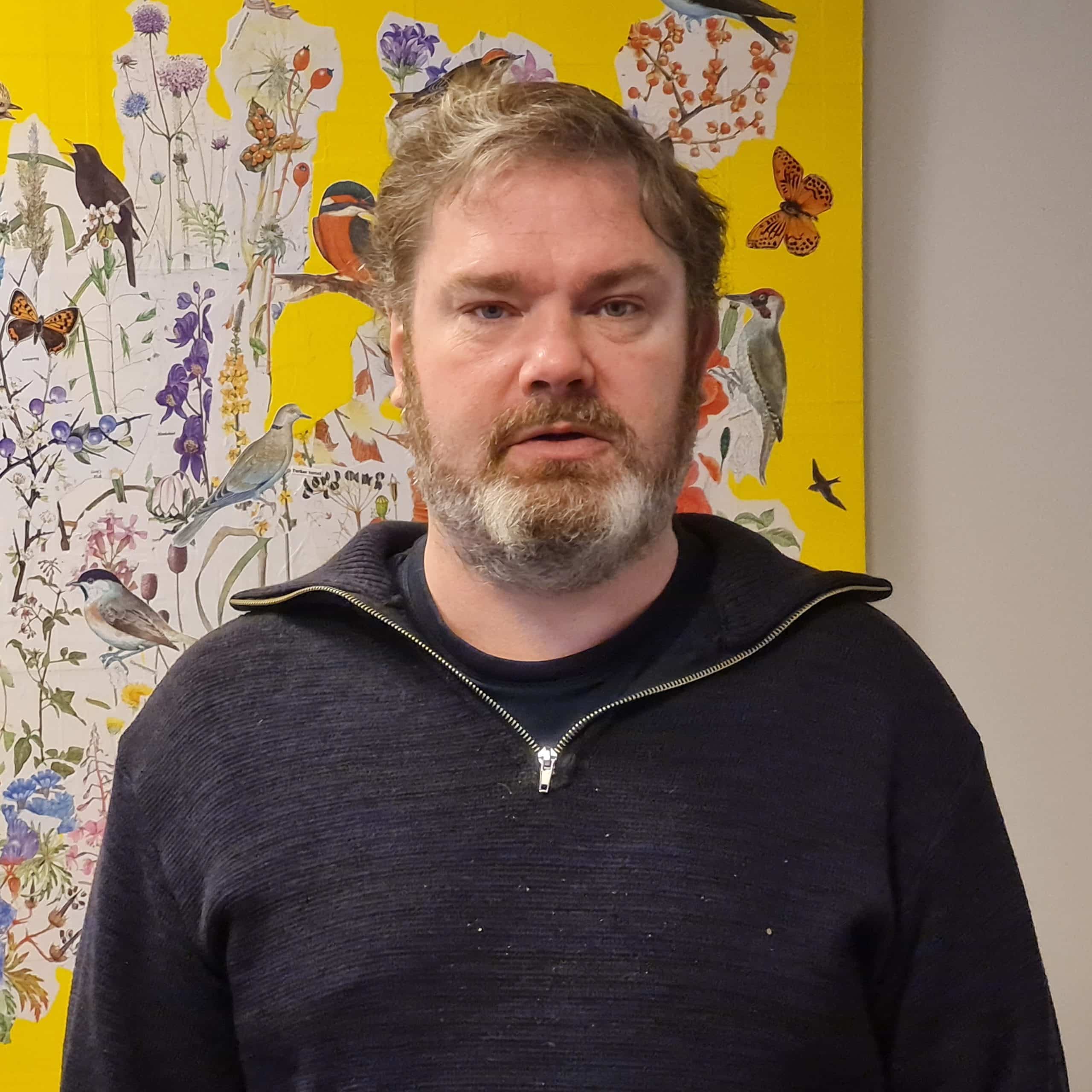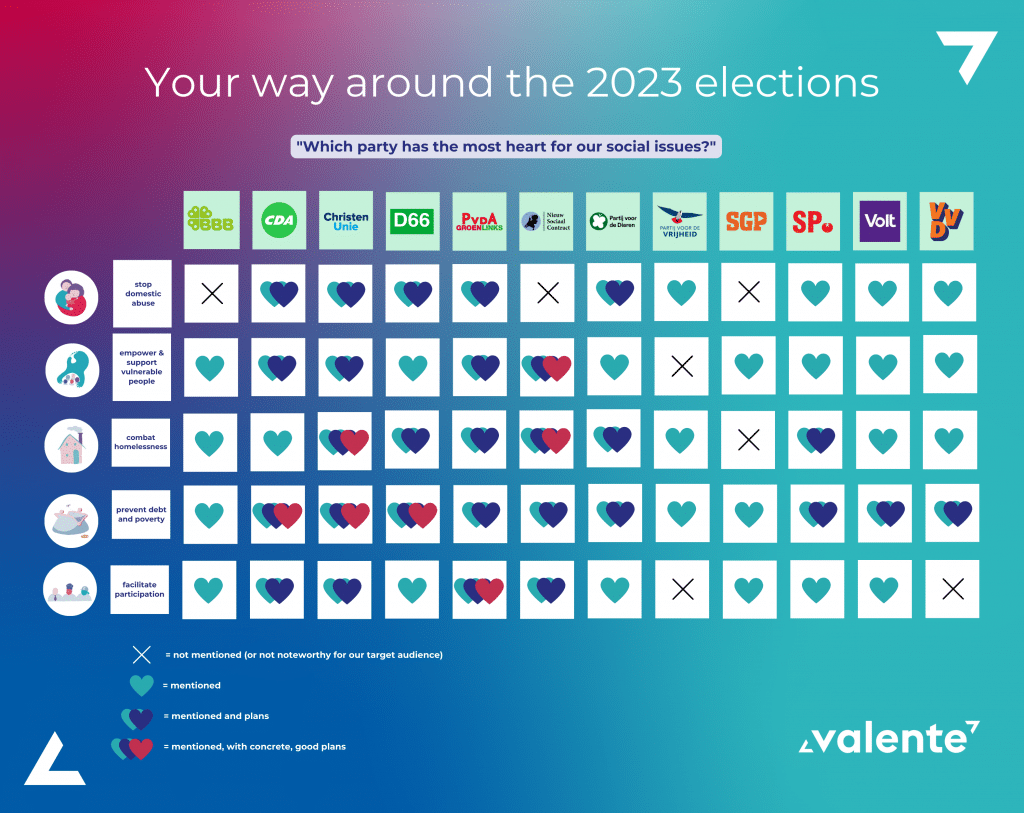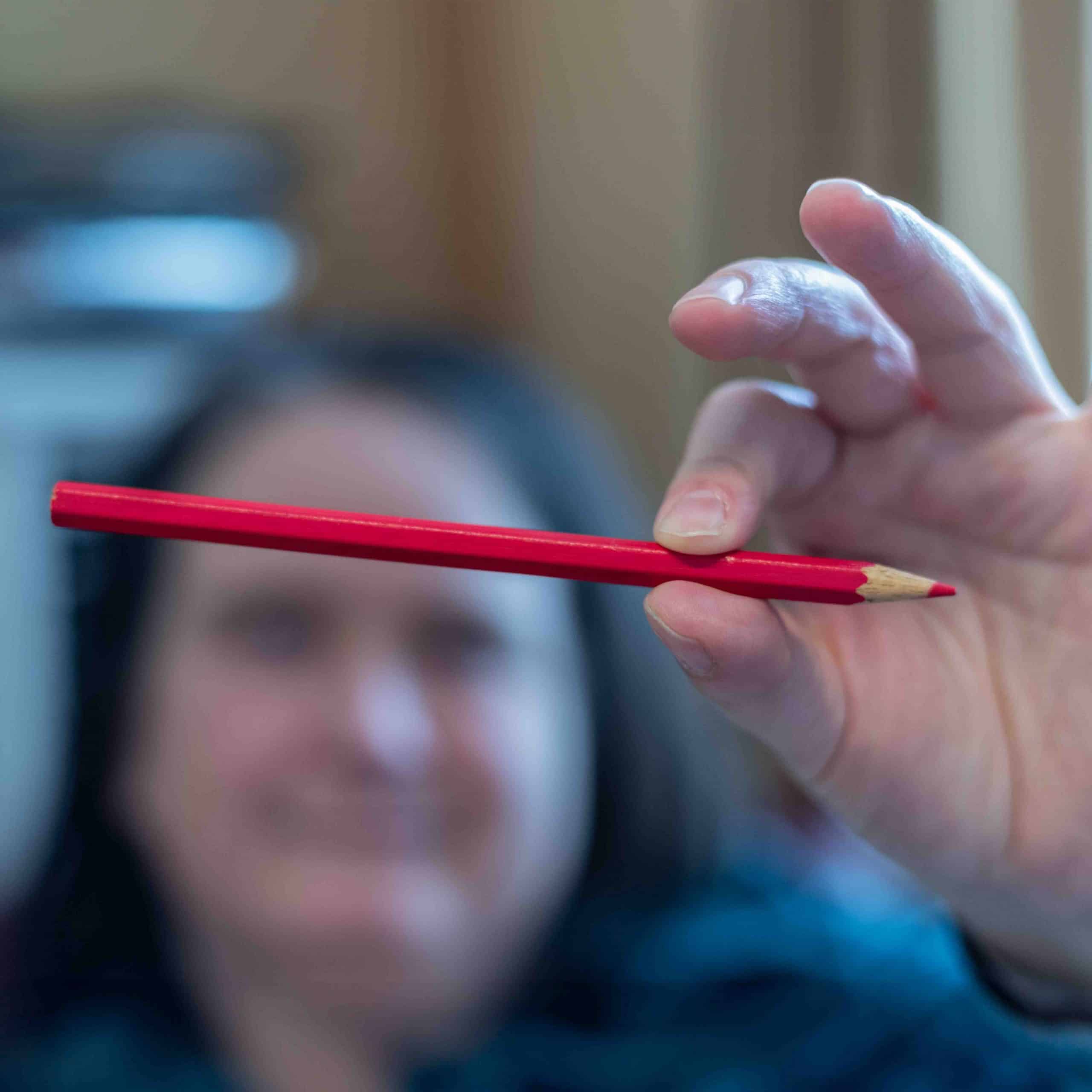Elections and homelessness in Europe
What can you do to adress homelessness in an election campaign? How can organisations make an impact – both with facilitating those experiencing homelessness to access their voting rights, as well as informing voters on the values and policies of different parties which relate to homelessness?
There is ample evidence that homelessness is currently increasing in most countries in Europe. This should be of the highest priority in the EU elections. For this reason, FEANTSA, the European Federation of National Organisations Working with the Homeless, asked us to write a contribution on elections and homelessness. They approached our communications advisor Kim van de Wetering because of our communication stategy for the national elections in 2023, such as our visuals and efforts to highlight the voices of clients.
See article in FEANTSA magazine (page 25).
‘Valente is the national association in the Netherlands for organisations that provide help and support to vulnerable people, such as people experiencing homelessness, people experiencing domestic violence, and people in assisted and sheltered housing. Our goal is to represent their interests. Valente’s members reach out to more than 150,000 vulnerable people on an annual basis. Since 2019, I have worked as a communications advisor at Valente, working in a Public Affairs team alongside several policy advisors, the director, and a communication officer to develop the communication strategy to bolster Valente’s lobbying efforts.
The great thing about my position is I’m involved in all of Valente’s dossiers and so can make connections – which was challenging when I was brand new in this trade, but after five years and obviously with a lot of input from my colleagues, this has gotten easier. And it’s what drives me, delving into this vast and intricate subject matter, to understand the interconnection between various parts, issues, legislation, and so forth. People who need the government most are being ground down by it. I’m not a politician, policymaker, or lawyer, but I strive to make a difference in society from my position and to the best of my abilities.
Elections and homelessness
The nature of homelessness in the Netherlands and the public and political views on it are shifting. Where it was once seen as a healthcare issue concerning mainly elderly white males with psychological and/or addiction problems, it has become – as in much of Europe – a housing issue with a strong economic aspect. The homeless demographic is younger and ethnically more diverse, there are more homeless women and girls than before, and their problems are often solely related to housing and finances, not psychological issues. That being said, there remains a lot of prejudice against homelessness and many systemic hindrances and political choices that make it hard to solve and prevent homelessness in the Netherlands.
The 2023 elections in the Netherlands provided an opportunity for political parties and candidates to address pressing social issues, including homelessness, in their platforms and agendas. Valente, as the national association for organisations providing help and support to vulnerable people, including people experiencing homelessness, took the initiative to raise awareness and advocate for policies addressing homelessness during the 2023 elections.

As voters considered their options and priorities, Valente’s campaign sought to highlight the importance of addressing homelessness as a critical issue that requires attention and action from elected officials. Our campaign aimed to ensure that the position of people in a vulnerable position in our society remained a priority for policymakers and politicians during the electoral process. By engaging in advocacy efforts, Valente sought to influence public discourse and policy decisions concerning these issues, advocating for comprehensive strategies that address its root causes and provide adequate support to those affected.
Communication products
Through communication and advocacy efforts, Valente aimed to ensure that homelessness remained a central topic of discussion throughout the electoral process, encouraging candidates and parties to propose meaningful solutions and commitments to address the issue. We made several communication products for our campaign: a pamphlet with five key points, five videos with our policy advisors explaining these key points, an analysis of the twelve largest political parties, a visual of this analysis, tips for client participation in the elections, and three client testimonies on their views regarding elections and the importance of voting. We made a landing page with these aforementioned products together with news and stories of clients illustrating the need for better political choices.
Overall, Valente’s 2023 campaign on elections and participation served as a platform to advocate for the rights and well-being of homeless individuals and to push for policy changes that would lead to tangible improvements in their lives.
The campaign in detail
The five key points we focused on for the elections were: stop domestic abuse, empower vulnerable people, combat homelessness, prevent debt and poverty, and facilitate participation. We decided on these five with our team, but the choice was obvious; I can’t think of any issues posing a greater problem for society as a whole. It’s precisely the people dealing with these issues who deserve the greatest effort from politicians – more than is currently the case.
We sent our pamphlet with these five key points to all the preparatory committees to use for their election programme. Quite a few of them responded, thanking us for our input. Some of them sent us a draft version of the text they had prepared for their election programme. We asked our members, should they be active in a political party, to raise the issue with their programme committee.

When the respective election programmes were published, we read the election programmes of all mentioned parties with our entire team and compiled the paragraphs about our topics. This allowed us to evaluate them in comparison to each other and provide our members, clients, and other voters with clear information about the plans of these political parties. We also made this document available on our website and distributed it with a visual. The visual is something I’m very enthusiastic about: a table with twelve political parties and how they score on our five key points. The election programmes add up to hundreds of pages, but our visual made it possible to discern a party’s position on five very important social issues. It was not our goal to influence voting behaviour, if that were even possible, and there is also not one party clearly the best for socio-economic themes. These are wicked problems we are dealing with.
Selection and ranking
The selection of parties included in our table was based on the party’s size and consistency in our House of Representatives. After publication, two parties sought to be included in our visual, but we could explain to them how this was our final selection based on objective criteria.We had produced something similar to this visual before, presented as a bingo card with chips for parties that had something about these topics in their election programme. They could score from 0 to 2 at that time.
This time we’ve added a third to it. We’re already pleased if a party includes one of these topics or groups in their programme, which was rewarded with one heart. Then there are parties that have plans along the lines of ’there’s room for improvement here’, or ‘we’re going to work on it’. But what our members and citizens grappling with these issues really need are concrete plans with a clear beginning and end, clear objectives, and integrated into existing structures. We’ve tried to represent this with three hearts. You can see that there aren’t many.

Input and impact
The outcome of the election was somewhat of an earthquake that we had not expected. However, I don’t believe there is more we could have done to impact the overall outcome. Political parties are still in the process of forming a government and there is no real expectation whether they will be able to form one. What this means for the issues of homelessness, domestic violence, or mental health, we have no real clue.
That said: the European Union represents a form of cooperation which offers chances for improvement and change for the better. This is why we will support our members with information how to involve people who are receiving help from shelters with the upcoming European elections. Keep raising awareness about these issues, continue facilitating healthcare organisations in their service provision and advocacy, and keep informing clients about their rights.
Clients’ participation in elections
We know that people experiencing homelessness do not always vote, for example, due to practical reasons or distrust towards the government. Do you discuss this with clients? How does voting work practically if you are homeless (election date, polling card, ID, polling station location)? Do people with a temporary address receive their polling card on time? We posed these questions to our members and invited them to discuss with their clients about the right and opportunity to vote. For this purpose, we provided them with some informative and practical tips – for example, about handing over the polling card, proxy voting, assistance in the polling booth for those with disabilities – with references to organisations that focus on the accessibility of elections. Some of our members decided to offer their shelter buildings as polling stations to literally decrease the distance between voters and the location where you can vote.
As part of the campaign, we’ve highlighted the voices of clients, including testimonies on their views regarding elections. There are three reasons why I interviewed clients. Firstly, we make an effort not to just talk about clients but include them in our policy and lobby. These are the people who know the issues inside out because they have lived it. Not only do their voices deserve to be heard, but they are indispensable in tackling these issues.
Speak up

We also encourage clients to also make their voices heard at the ballot box. Together, they represent around 100,000 votes that can contribute to a better society. Personally, I believe that the government should primarily focus on vulnerable citizens – knowing that when they are in a better position, it benefits everyone in the Netherlands. If the clients of our members speak up, perhaps there will be a coalition agreement and policies that enable this.
And third: stories stick. They resonate. I see this in all our communication activities. On our website, personal stories are the most read, social media posts about them get the most shares and likes, and politicians (people in general) understand cold data and information much better when it’s given a face. Last summer, the Ministry of Health, Welfare and Sport made it possible for nine portraits I had taken of clients to be exhibited in the lobby of the ministry building (with a QR code to their stories). The exhibition was opened prior to a discussion on complex legislation, funding, and client flows. One of the individuals I had portrayed was present and invited to share his story. From my colleague who attended the subsequent meeting, I heard that all the faces and stories had a tremendous impact, and the discussion was truly conducted with the people behind the numbers in mind. I found it to be a beautiful initiative, and a very hopeful example of the difference you can make in society with good use of communication.’
